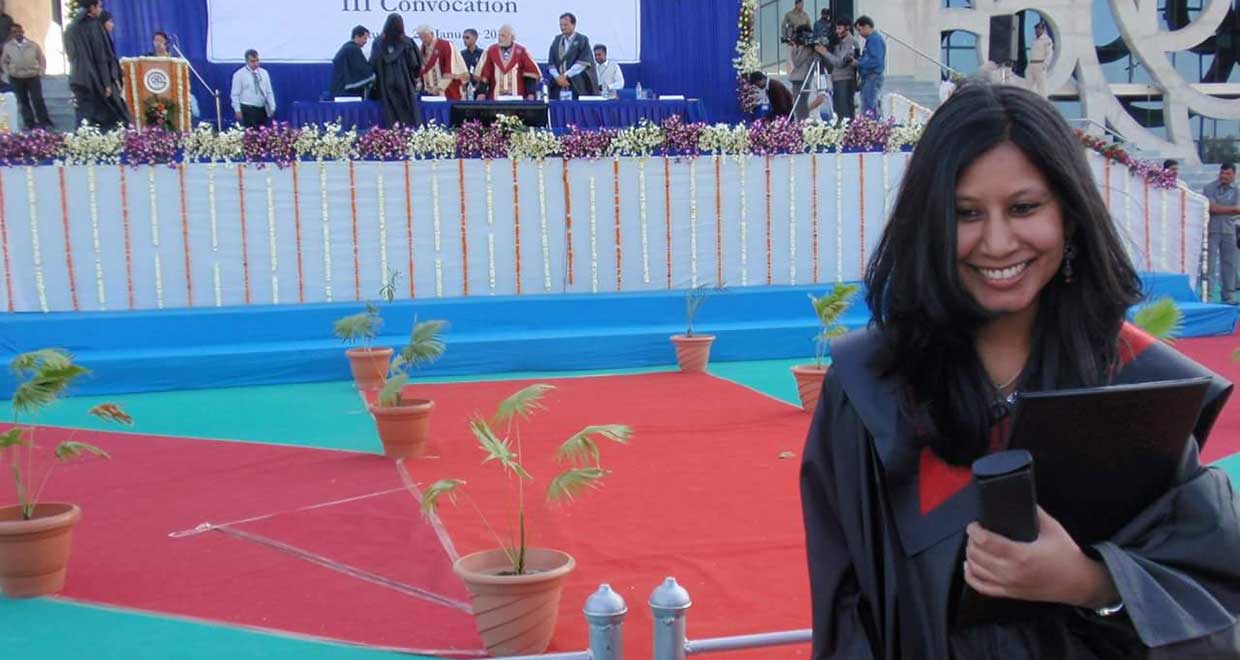Smita Reddy graduated from Gujarat National Law University in 2011. At present she is working at LexStart. LexStart is a start-up which primarily caters to other start-ups assisting right from their incorporation to being their in-house counsel.
In this interview she talks to us about:
- Importance of CGPA.
- How her appointment at LexStart took place.
- Difference in working at LexStart from Amarchand & Mangaldas.
- Strategy to deal with errors and mistakes.
How would you like to introduce yourself to our readers?
My name is Smita Reddy. I graduated from Gujarat National Law University in 2011 and I am currently working at LexStart. LexStart is a start-up which primarily caters to other start-ups assisting right from their incorporation to being their in-house counsel!
How important is a CGPA for recruiters to assess students?
CGPA being extremely important for campus placements is a given. It helps recruiters understand that you are willing to give it your all, which is always a good thing. Since they don’t really have your work experience to grill you on, your CGPA is reflective of your attitude towards work.
Having said that, I know of some brilliant lawyers who weren’t great students to begin with. So yes, while having a good CGPA is crucial, it is also imperative that you intern before you start working. I cannot begin to stress enough on how important internships are in shaping you as a lawyer. I see so many law students wasting their internships and so many wasted opportunities. What law students need to understand is that these internships also help you in networking, plus if you’ve done a good job, you’re sure to be called back or given a pre-placement offer.
Did you face difficulties in the beginning of your work at Amarchand & Mangaldas?
Yes and no, because the difficulties I faced were more to do with not knowing how to go about things. I was a little lost, but since I joined with 15 other people from my law school, the process may have been a lot smoother for me than it was for other people. It was quite overwhelming in that sense, but once I got the hang of things, knew what was required of me, it became easier.
It also helps if you know and understand that no one expects you to know everything at this stage. This is exactly what I tell fresher’s. You only need to start worrying if you’re still lost at 3 years of working!
When did the transformation from a law student to a lawyer take place?
I think the transformation takes place from the moment you have to take charge of something. I remember the first major assignment (where I was solely responsible for things) I was given at AMSS was helping in filing Form FC TRS. Though it would have been simpler for my senior to do it, she assigned it to me because she thought it would help me understand how things work better. And it did!
The moment you are responsible for something, you somehow take greater care, than you would if you had a senior reviewing your work. I was blessed that way, because I was always part of teams which weren’t too big to begin with, so good assignments would end up coming to the juniors in the team.
Do you believe that drafting legal documents is an essential skill that most law schools in India omit to teach their students?
Yes! While, to be fair, we did have a legal drafting course in GNLU, a couple of months of a course do not help you in drafting legal documents. What is surprising is that drafting constitutes around 60% of your work as a lawyer, irrespective of the field you are in. It is a skill set which I believe is extremely important to have as a lawyer. Plus, if you have a course on drafting in law school, you are not just suddenly thrown into drafting a share purchase agreement, without knowing the basics.
I have had interns who didn’t know how to do basic drafting, which is quite alarming, which is why I think the current curriculum needs to undergo changes, maybe limit learning the theoretical aspect of law to the first couple of years, and focus more on developing you practically as a lawyer.
How did your appointment at “LexStart” take place?
It actually happened very quickly and at the right time, I must add. I live in Tirupati, I love the place but it isn’t exactly bustling with corporate lawyers. I had reached a point of my sabbatical where it was no longer fun to be doing nothing; I was getting antsy and had to start doing something.
My first round of interview was with Anisha Patnaik, one of my co-founders. It happened thanks to this friend of mine who had reached out to me informing me that his senior wanted a legal consultant, and that it would even be okay if I wanted to work from home. That literally sealed the deal for me, because I wasn’t keen on moving out of Tirupati. Imagine you can reach from Point A to Point B in ten minutes!
Anyway, I am digressing, once I heard that I could work from home, I immediately asked him to send me all the necessary details. The next day Anisha reached out to me and I just wasn’t prepared even though I had gone over my CV a million times before that. After my interview with Anisha, I spoke to my other co-founder, Karthik Chandrasekar. Post this I started working in a days’ time!
How was the job interview? Do you remember any of the questions asked to you?
It went rather well, given that I had absolutely lost touch with law in that one year of sabbatical! Also, my founders who took my interview made me feel at ease, being fully aware that I hadn’t worked in a while and may need some time to get back to the grind. They also encouraged me to ask them questions, which I thought was a pleasant change from the usual interviews that one is used to.
I was asked questions around VC investments primarily; I was able to answer most questions, except for one. I remember it distinctly because the moment I answered the question, I knew I was wrong, the question was on liquidation preference and what does it mean for an investor.
How is working at LexStart any different from working at Amarchand & Mangaldas?
I will always maintain I loved working at AMSS, Mumbai and Delhi and will always attribute my growth as a corporate lawyer to it.
LexStart has been a different experience from AMSS, since you act as legal counsels to companies that are growing with you. What starts with helping in the incorporation of a new company also leads to acting as their lawyers in their Series D round of funding. What this has also done is given me a fair sense of what founders in start-ups expect their lawyers to do. Since I was one of the first few people to be recruited at LexStart, I had my hands full with transactions which I was to lead, which was wonderful, since this immediately gives you a sense of work ownership. Plus, there is so much happening in the start-up space, that there is never a dull moment at work!
What has been your strategy to deal with errors and mistakes? How would you suggest a young associate to deal with them?
In the past, whenever I have made a mistake, I have made it a point to inform my senior. What this ends up doing if helping you learn how to handle mistakes.
My only advise to young associates would be to always reach out to your immediate supervisor or a senior on the particular transaction and let them know. DO NOT try and hide it and hope no one would notice, because someone will, or even fix it yourself. They will do the necessary damage control. Most importantly, learn from your mistakes, check things twice or even three times before sending them out.
Having said that, please remember you are human, and you are bound to make mistakes now and then. Move on, don’t be too hard on yourself, because that will just make things worse.
What is your message to young law students?
Relax and breathe!
There is a lot of worrying about targets and deadlines coming your way once you graduate law school, but please do take internships seriously. Try gaining experience across all fields, whether it is litigation, NGO or corporate internships. It is good to know what you want from your first year in law school, but overtime you evolve as a person, and may not enjoy the fat-cheque-paying-corporate job you once dreamed of getting. Know that these varied experiences help you understand what you would actually enjoy doing and make an informed decision when its time.


























